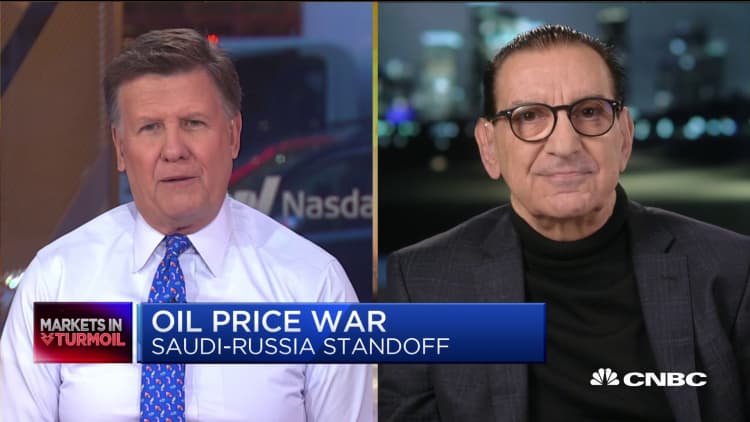
OPEC kingpin Saudi Arabia unveiled plans Wednesday to dramatically ramp up oil production, raising the stakes of an all-out price war with non-OPEC leader Russia.
State-owned oil behemoth Saudi Aramco said Wednesday that it had been asked by the Saudi energy ministry to raise its production capacity to 13 million barrels per day (bpd), up from 12 million bpd at present.
The oil-rich kingdom has been pumping around 9.7 million bpd in recent months, but it has plenty of spare capacity to pump more crude, with hundreds of millions of barrels also in storage.
"This bold move to attempt to order production to 13 (million) barrels confirms that Saudi is trying to apply maximum pressure on both Russia and the U.S.," Cailin Birch, a global economist at the Economist Intelligence Unit (EIU), told CNBC via email on Wednesday.
"By sending signals that they will flood the market as soon as possible, they may be hoping to either force Russia back to the negotiating table or to prompt a wave of bankruptcies and investment cuts in the U.S. that would have a noticeable impact on shale production," Birch said.
International benchmark Brent crude traded at $36.05 Wednesday morning, down over 3.2%, while U.S. West Texas Intermediate (WTI) stood at $33.30 around 3% lower.
Oil prices have almost halved since the start of 2020.
'Painful … but temporary'
The latest sell-off was preceded by a breakdown in talks between an alliance of some of the world's largest oil producers late last week.
Markets had been hoping for an agreement between Saudi Arabia and Russia, as well as other OPEC and non-OPEC producers, in order to curb oil output and prop up prices; their failure to agree led oil prices to crash on Monday.
Analysts believe the producer group's misstep has created an "unprecedented" situation in energy markets, with U.S. shale expected to take the brunt of the pain.
"The Saudi-Russian relationship — political as well as economic — is much more important in the light of U.S. energy independence than it was before the rise of the U.S. shale industry," Tamas Varga, senior analyst at PVM Oil Associates, told CNBC via email on Wednesday.
"Therefore, the current stand-off between the second and third oil producers in the world should turn out to be temporary. Painful as far as the global oil balance is concerned but temporary," he added.
'A dangerous play'
Saudi Aramco's announcement on Wednesday comes less than 24 hours after the oil giant announced plans to ramp up production to 12.3 million bpd from April.
That's despite Russian Energy Minister Alexander Novak leaving the door open for Moscow and Riyadh to return the negotiating table in order to stabilize markets.
Russia's energy ministry is expected to hold a meeting with Russian oil companies on Wednesday, Reuters reported Tuesday, citing two unnamed sources.
They are expected to discuss whether to prolong Russia's alliance with OPEC.
"Saudi could probably weather the storm with oil prices below $40/b for the rest of the year, but this will be painful for its economy as well. It appears that they're trying to shock the market quickly, in the hope that it stabilizes later in the year," the EIU's Birch said.
"This is a dangerous play, though," she added.


